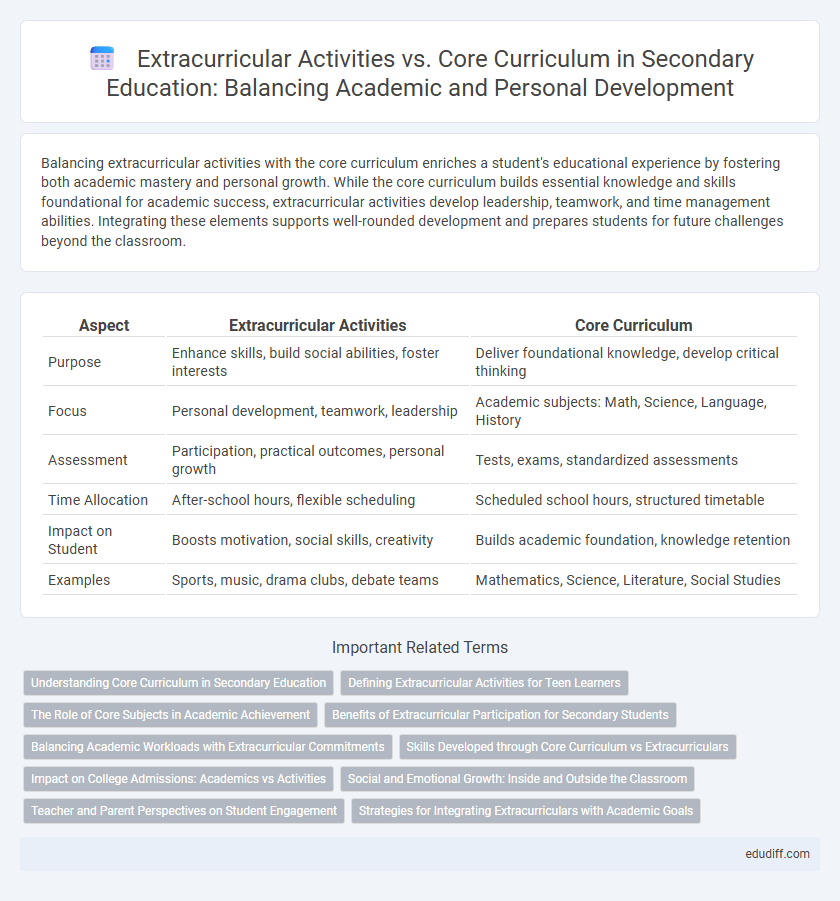Balancing extracurricular activities with the core curriculum enriches a student's educational experience by fostering both academic mastery and personal growth. While the core curriculum builds essential knowledge and skills foundational for academic success, extracurricular activities develop leadership, teamwork, and time management abilities. Integrating these elements supports well-rounded development and prepares students for future challenges beyond the classroom.
Table of Comparison
| Aspect | Extracurricular Activities | Core Curriculum |
|---|---|---|
| Purpose | Enhance skills, build social abilities, foster interests | Deliver foundational knowledge, develop critical thinking |
| Focus | Personal development, teamwork, leadership | Academic subjects: Math, Science, Language, History |
| Assessment | Participation, practical outcomes, personal growth | Tests, exams, standardized assessments |
| Time Allocation | After-school hours, flexible scheduling | Scheduled school hours, structured timetable |
| Impact on Student | Boosts motivation, social skills, creativity | Builds academic foundation, knowledge retention |
| Examples | Sports, music, drama clubs, debate teams | Mathematics, Science, Literature, Social Studies |
Understanding Core Curriculum in Secondary Education
Core curriculum in secondary education includes essential subjects like mathematics, science, language arts, and social studies designed to build foundational knowledge and critical thinking skills. This structured academic framework ensures students meet standardized learning objectives vital for graduation and college readiness. Emphasizing mastery of the core curriculum promotes cognitive development and prepares students for complex problem-solving required in higher education and careers.
Defining Extracurricular Activities for Teen Learners
Extracurricular activities for teen learners encompass organized pursuits beyond core curriculum subjects, including sports, arts, clubs, and volunteer work. These activities promote skill development, social interaction, and personal growth, complementing academic learning. Participation in extracurriculars enhances time management and leadership abilities essential for holistic teen education.
The Role of Core Subjects in Academic Achievement
Core subjects such as mathematics, science, and language arts form the foundation of academic achievement by developing critical thinking, problem-solving, and communication skills essential for higher education and career success. Mastery of these core curriculum areas correlates with improved standardized test scores and overall student performance, reinforcing their central role in secondary education. While extracurricular activities enrich personal growth, core subjects remain pivotal in establishing essential knowledge and competencies.
Benefits of Extracurricular Participation for Secondary Students
Participation in extracurricular activities enhances secondary students' social skills, time management, and leadership abilities, complementing the core curriculum's academic focus. Involvement in clubs, sports, and arts fosters teamwork and resilience, contributing to overall personal development and academic success. Extracurricular engagement also provides opportunities for skill-building and college applications, making it a critical component of holistic education.
Balancing Academic Workloads with Extracurricular Commitments
Balancing academic workloads with extracurricular commitments requires strategic time management and prioritization to ensure neither core curriculum nor activities suffer. Students benefit from setting clear goals and using planners to allocate dedicated time blocks, which helps maintain academic performance while engaging in meaningful extracurricular experiences. Research shows that well-managed extracurricular involvement can enhance skills like leadership and teamwork without compromising academic success.
Skills Developed through Core Curriculum vs Extracurriculars
Core curriculum develops foundational skills such as critical thinking, literacy, and quantitative reasoning essential for academic success and lifelong learning. Extracurricular activities enhance social, leadership, and teamwork abilities by providing practical, real-world experiences beyond the classroom. Balancing both core curriculum and extracurricular involvement fosters a comprehensive skill set that supports personal growth and career readiness.
Impact on College Admissions: Academics vs Activities
Extrtracurricular activities complement core curriculum by showcasing students' leadership, creativity, and time management skills, which are increasingly valued in holistic college admissions. While strong academic performance in subjects like math, science, and English remains crucial, participation in sports, clubs, and volunteer work can distinguish applicants in competitive selection processes. Colleges prioritize a balanced profile reflecting both rigorous coursework and meaningful extracurricular engagement to predict future success and campus contribution.
Social and Emotional Growth: Inside and Outside the Classroom
Extracurricular activities enhance students' social and emotional growth by fostering teamwork, leadership, and communication skills that complement the core curriculum's academic focus. Participation in sports, clubs, and arts provides real-world experiences that build resilience, empathy, and self-awareness beyond classroom learning. Integrating these activities with core subjects creates a holistic education environment supporting emotional intelligence and social development essential for lifelong success.
Teacher and Parent Perspectives on Student Engagement
Teachers emphasize that extracurricular activities foster student engagement by enhancing social skills and motivation, complementing the core curriculum's academic focus. Parents often view extracurricular involvement as essential for holistic development, believing it strengthens resilience and leadership qualities alongside academic achievement. Both perspectives highlight the importance of balancing structured academic instruction with varied extracurricular opportunities to optimize student engagement and learning outcomes.
Strategies for Integrating Extracurriculars with Academic Goals
Integrating extracurricular activities with core curriculum enhances student engagement and reinforces academic skills through practical application. Structured programs that align club projects, sports, or arts with curricular objectives promote interdisciplinary learning and time management. Schools adopting strategic scheduling and collaborative teacher-coach planning see improved student outcomes and balanced workloads.
Extracurricular Activities vs Core Curriculum Infographic

 edudiff.com
edudiff.com